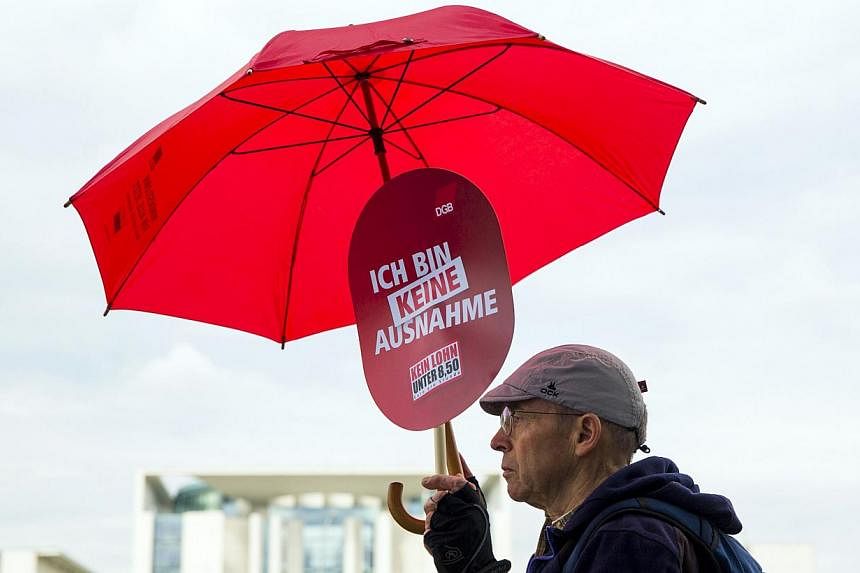BERLIN (AFP) - Germany is set to introduce a national minimum wage on Thursday, long resisted by conservatives who say it will make industries uncompetitive, but which is hoped will help the poor and stimulate demand.
The step was a red-line issue for the centre-left Social Democrats when they teamed up last year with Chancellor Angela Merkel's conservatives to form a "grand coalition" government.
The minimum wage of 8.50 euros (S$14.45) an hour will eventually benefit more than five million workers in the low-wage sector when it is phased in between January 1, 2015 and 2017.
Introducing a universal minimum wage brings Europe's biggest economy in line with 21 of the EU's 28 member states, and with the wishes of the German electorate who have overwhelmingly supported the move in opinion polls.
The starting level, set to be reviewed by a labour market commission every two years, is in line with those in other major developed economies - slightly less than that in France (9.53 euros) but above Britain's £6.31 (7.91 euros).
France has hailed Germany's decision as a step away from Ms Merkel's austerity focus and toward pro-growth policies, and as a way of boosting consumer demand to bring down its large trade surplus.
Inside Germany, industry groups long protested and warned the minimum wage will destroy jobs, especially in the formerly communist east where, 25 years after the fall of the Berlin Wall, wages are still lower than in western states.
Amid such fears, and months of haggling, the government has excluded some groups, among them under-18-year-olds and the long-term unemployed during their first six months in a new job.
The bill's passage in parliament is virtually guaranteed given the strong majority of the ruling coalition. The far-left Linke and Greens party opposition support the idea But some conservatives are set to vote against the bill on principle, arguing that wages should be negotiated between employers and unions, the traditional German model, not set by the state.
"The law goes in the wrong direction, many will vote no," said conservative lawmaker Peter Ramsauer, a former transport minister, who warned that the step will harm the "competitiveness and future of Germany".
Ms Merkel herself had long opposed the minimum wage, raising fears it could force many small- and medium-sized businesses to lay off workers, and favouring instead separate pay deals for each industrial sector and region.
But she caved in after tough haggling late last year with the Social Democrats, who had argued that steps were urgently needed to narrow a growing pay gap in Germany's 42-million-strong labour market.
The Organization for Economic Cooperation and Development (OECD) warned in May that Germany must do more to reduce poverty risks made worse by decade-old labour market reforms that have reduced joblessness but widened inequality.
It urged Germany to "heal the split in the labour market" between employees with permanent contracts who have better protection against dismissal and often better salaries, and those with temporary contracts with little protection and lower pay.
As the parliamentary vote has neared, Labour Minister Andrea Nahles, a Social Democrat, has agreed to more temporary exceptions, also including for example newspaper delivery workers.
Fears that prices for strawberries and asparagus will explode also won farmers a reprieve for seasonal workers, many of whom travel to Germany from neighbouring countries, and the right to factor in their board and lodging.
The loopholes drew harsh criticism from unions.
"Work is work, and to pay less in certain sectors than in others is discriminatory," charged Stefan Koerzell of the DGB unions federation, while the Greens criticised the outcome as "a Swiss cheese" full of (loop)holes.

